Fighting Wildlife Crime in New Zealand
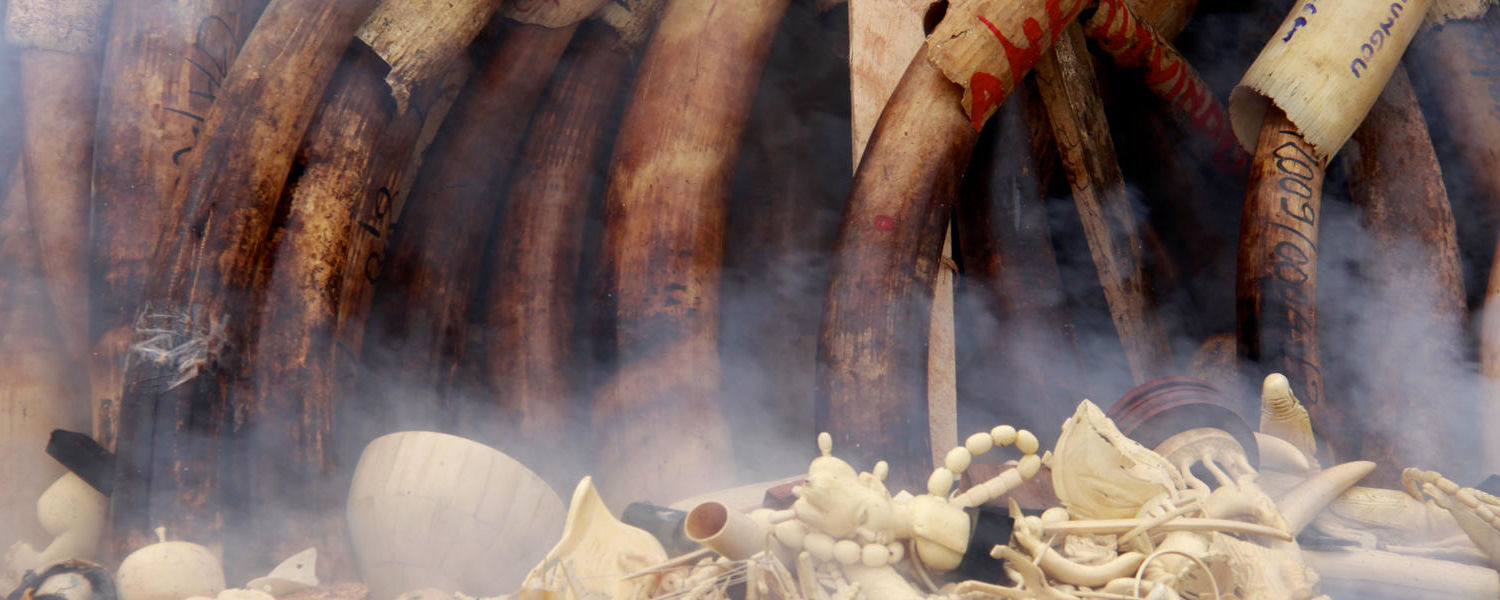

** UPDATE: New Zealand Government Reviewing Trade In Endangered Species **
The Government’s proposal to close down New Zealand’s elephant ivory market is a move welcomed by the Jane Goodall Institute New Zealand (JGI NZ). Thousands of elephants are slaughtered each year for their tusks. In response to the crisis many countries including the UK, China, US, France, the Netherlands, Taiwan, Singapore, Hong Kong, Australia, Belgium and Israel have either closed or are preparing to close their domestic ivory trades.
JGINZ encouraged all New Zealanders to make submissions in support of Government’s proposal to ban the domestic trade and importation of elephant ivory, and provided a 'ready-submission'. The submission date closed on October 25th. We now await the next steps in the review process.
You can read the submission we provided to the review process.

NEW ZEALAND'S IMPACT ON WILDLIFE TRADE
New Zealand is most surely included in the web of illegal wildlife trafficking. Items regularly coming to or across the New Zealand border include ivory, rhino horn, coral, shells, leather products, seahorses, butterflies, turtles, tortoises, and crocodiles. Also skulls of primates and alligators, leopard and tiger skin, and parts of the critically endangered pangolin.
Traditional medicines containing ingredients that come from a range of endangered animals including from tiger claws, lion bones, rhino horn, pangolin, bears, turtles and more.
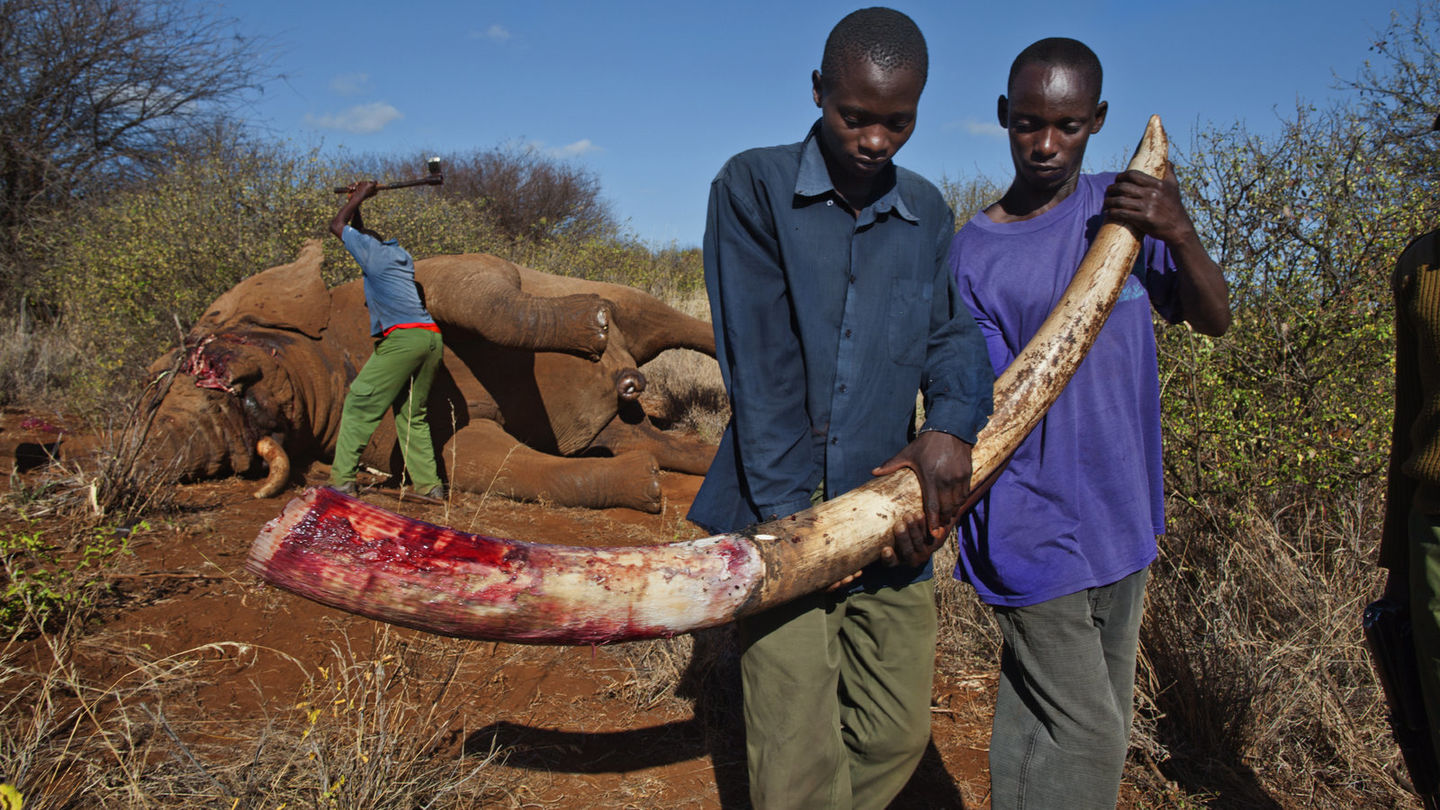
IVORY TRADE: TIMELINE & NEW ZELAND INVOLVEMENT
- 1975 & 1977 Elephant listed on CITES to protect from potential harms of international trade.
- 1979 African Elephant population 1.3 million
- 1988 Elephant population cut in half despite after 10 years of “regulated” international ivory trade
- 1989 Global ban on elephant ivory trade (CITES agreement) – New Zealand: Allow ivory through the NZ boarder with a CITES certificate or permit. Domestic trade of ivory items allowed to continue (with no checks on source of items) and assumption all ivory items here legally. Illegal 'product on' trade continues the demand.
- 2009 onwards Elephant poaching and illegal ivory trade accelerates to unprecedented levels
- 2014 Dr. Goodall joined prominent New Zealanders in an open letter to the New Zealand government urging a complete ban on all ivory trading in New Zealand and to crush the Crown's confiscated ivory stockpile. "When the buying stops, the killing can too".
- 2014 TradeMe committed to no longer allowing trade in any items that contain ivory (and products containing other endangered species).
- 2016 Research published IFAW Under the Hammer Report – Nine month investigation showed that hundreds of items in the domestic ivory trade market in New Zealand are traded at auction houses without papers to verify age or source. More than 60% ivory items being sold in New Zealand are carvings and tusks (not ivory-handled cutlery and serving ware). No checks and balances on domestic trading means if ivory gets into New Zealand illegally it can easily be sold on the domestic market and make money.
- 2016 Historic international decisions(at CITES and IUCN) to close all domestic ivory markets – Key reason – to stop legal markets providing cover for an illegal market to operate. New Zealand voted for in support, but has not acted on this.
- Domestic ivory markets are steadily closing around the world – United States, China, Hong Kong, France, United Kingdom, European Union, Taiwan. Current Australian Parliamentary Inquiry into the trade.
- 2018 London Conference on Illegal Wildlife Trade 11th 12th October – Conference will focus on tackling global wildlife trade as a serious crime; build coalitions to stop it; and closure of markets. New Zealand has been invited.
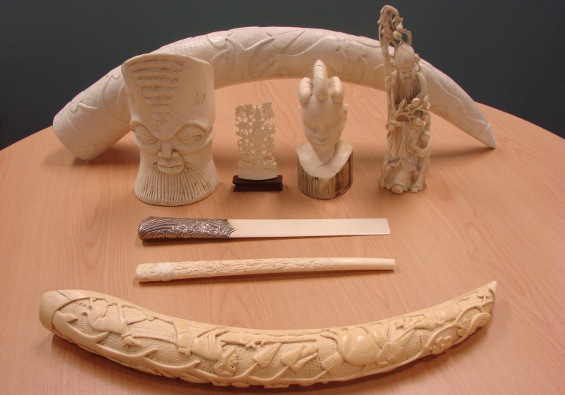
CURRENT STATUS OF IVORY TRADE IN NEW ZEALAND
Despite international commitments and actions, New Zealand, a party to CITES, is still allowing a domestic ivory trade market to exist.
Despite an international ban on commercial ivory trade since 1989, the 2016 study showed that the majority of items being trade 'legally' in the New Zelanad domestic market are being traded without the supposed necessary papers. This trade and demand contributes to the current elephant poaching crisis in Africa.
As Africa continues to lose one elephant every 25 minutes to the illegal ivory trade, New Zealand, seemingly unconcerned—or perhaps uninformed—allows the domestic trade of tens of thousands of dollars each year in ivory.
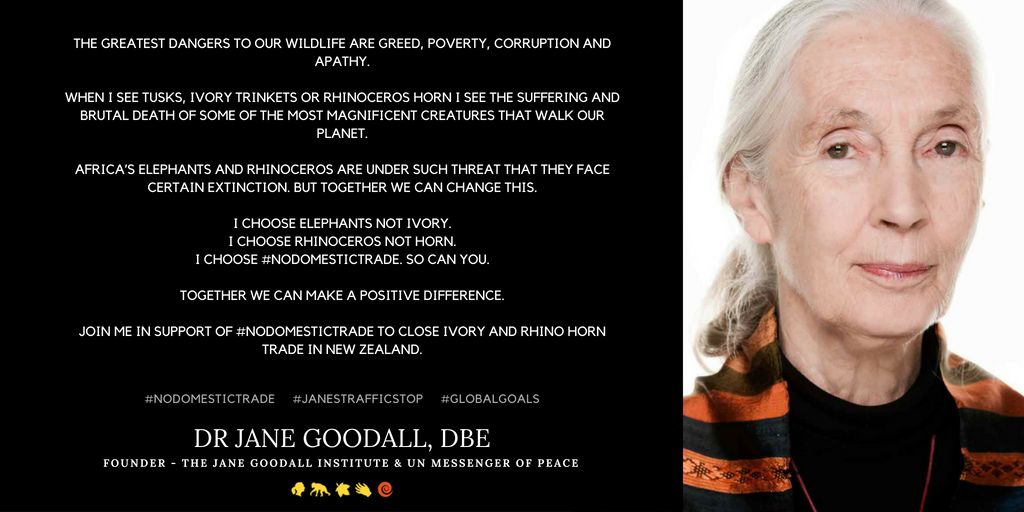
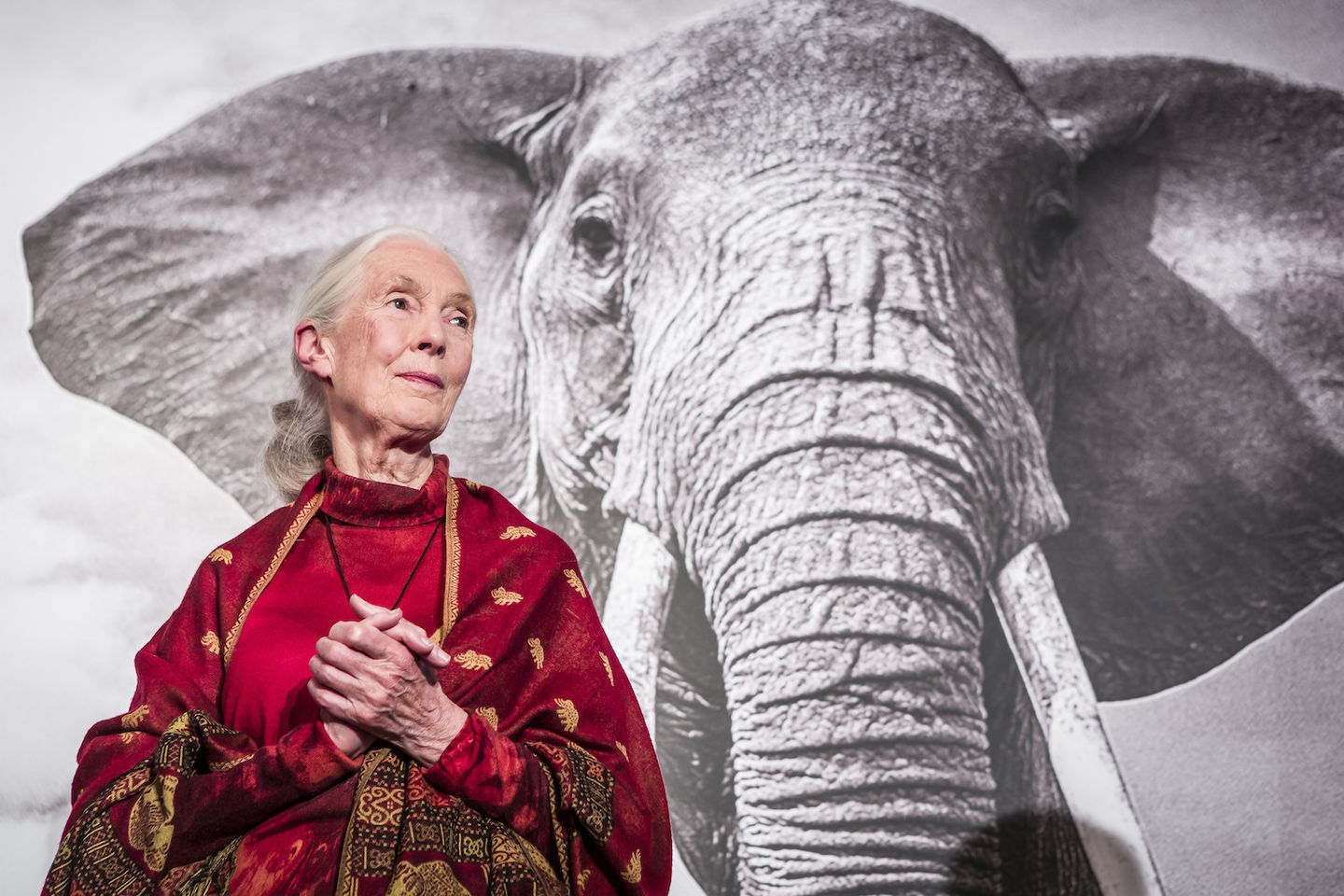
HOPE IN ACTION - NO DOMESTIC TRADE
JGINZ is calling on New Zealand to close the domestic ivory trade market.
It is time that New Zealand ends its contribution to the trade in wildlife - Act now to say No Domestic Trade
#NoDomesticTrade #JanesTrafficStop
To potential New Zealand buyers:
- Refrain from purchasing any elephant ivory or rhino horn products. If purchasing, only do so where appropriate certification and/or provenance information is provided prior to purchase.
- Report any instances of suspect wildlife trade to the relevant enforcement authorities in New Zealand - cites@doc.govt.nz
To the New Zealand Government:
- Introduce offence provisions for cases where wildlife are offered for sale without the necessary proof of legality. This will place legal responsibility for the sale of wildlife products on prospective sellers.
- Increase resources to relevant management and enforcement authorities to ensure international and domestic regulations concerning the trade in wildlife products are being enforced.
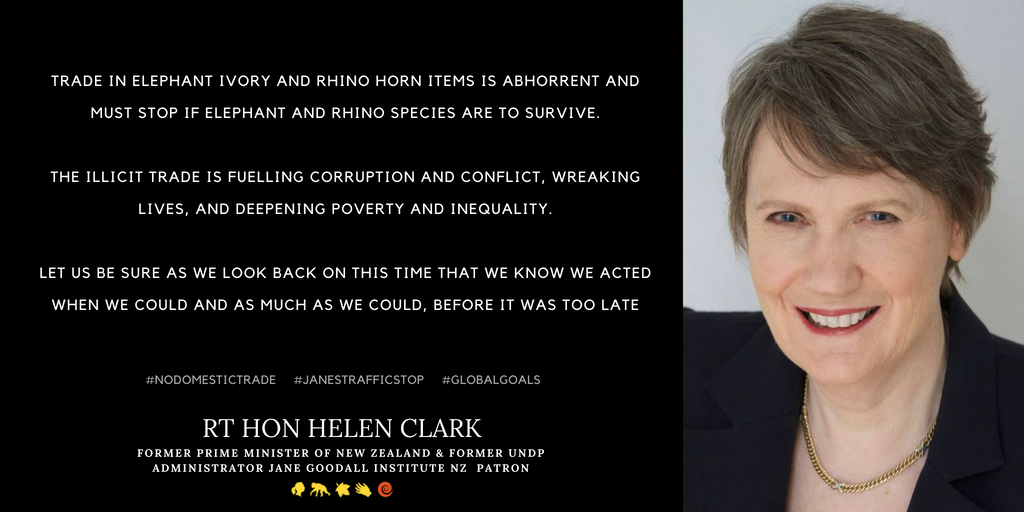
Closing The New Zealand Domestic Ivory Market
This would:
- Remove the financial value from the ivory.
- Reduce the opportunity for illegal items to be laundered through the legal market.
- Send a clear message that New Zealand no longer considers ivory to be an acceptable commodity.
- The ban would not affect the ownership, inheriting, donating or bequeathing of ivory items where this is currently allowed.
- Ensure New Zealand is aligned with the international commitments it has made and is part of the solution to the global wildlife trade crisis.
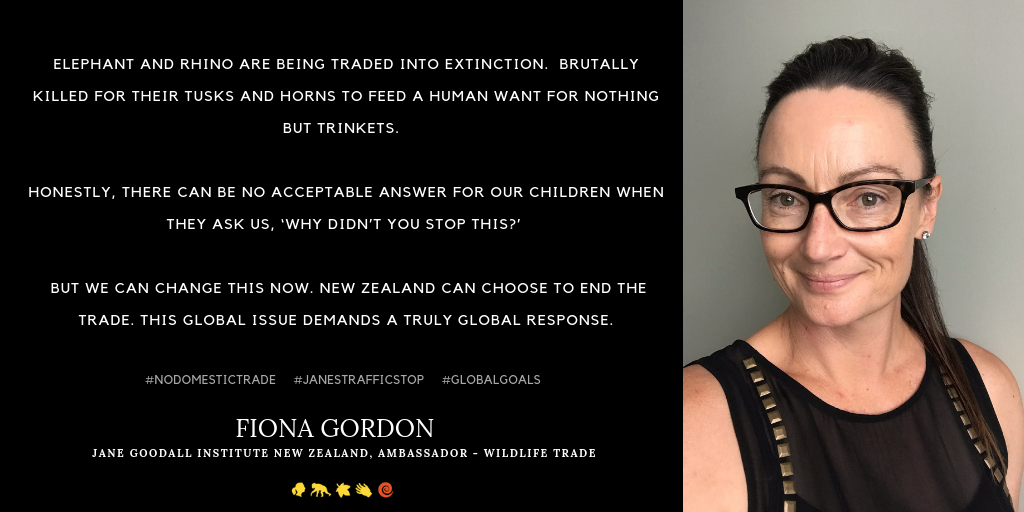
To read more about how New Zealand is contributing to the demise of elephants and rhinos read "Under the Hammer", a 9-month investigation into the ivory and rhinoceros horn trade at auction houses in Australia and New Zealand, co- authored by JGI New Zealand Ambassador, Fiona Gordon.
Fiona Gordon is a New Zealand based environmental policy analyst who has been researching and taking action on the global illegal wildlife trade issue since 2013, with particular interest in the Convention on International Trade in Endangered Species and related New Zealand policy, legislation and trade data.
Read our recent blog on the New Zealand Government assessing the need for ivory trade regulation.
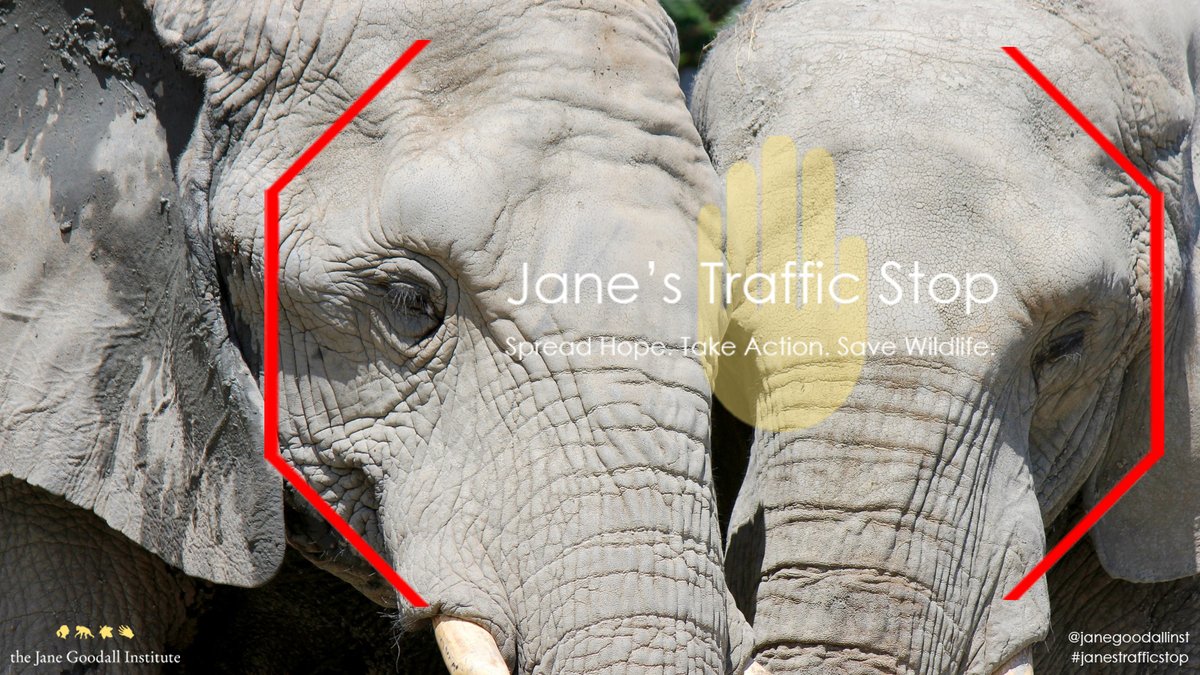
Take Action
Visit our No Domestic Trade 1-Click campaign and send a letter to the New Zealand government to urge the end of the domestic trade of elephant ivory and rhino horn in New Zealand.
Share what you’ve learned. #NoDomesticTrade #4EverWild #JanesTrafficStop
We must tell the world that wild animals were not put on the earth to be hunted to extinction and sold off in pieces as trinkets and trophies. We also must not support the business of wildlife trafficking, and shop with a greater awareness to avoid buying illegal animal products or support companies that do. Each of us is only one voice in the fight to stop illegal wildlife trafficking, but together our message will be impossible to ignore.